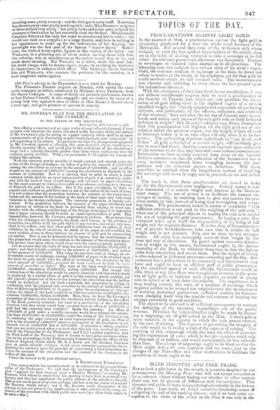TOPICS OF THE DAY.
PROCLAMATIONS AGAINST LIGHT GOLD.
IN the summer of 1842, a proclamation against the light gold in circulation paralyzed for a time the whole retail business of the Metropolis. For several days none of the tradesmen with whom artisans, or even the less opulent householders of the middle class are in the habit of dealing, ventured to take a sovereign at its full value: An arbitrary guess-work allowance was demanded. Traders in sovereigns at reduced value started up in all directions. The labouring man was mulcted in a serious ratio of his week's wages. Gold, the common medium of exchange at the time, he dared not refuse to receive at the hands of his employer, yet for that gold he could nowhere obtain its full nominal value. The inconvenience was irksome and irritating to every class ; the loss pressed upon the industrious labourer.
With the annoyance of that time fresh in our recollection, it was not without considerable surprise that we read a proclamation in the Gazette of Tuesday last, which not only prohibits the circulation of all gold falling short in the slightest degree of a certain specified weight, but "strictly requires and commands all our loving subjects, and particularly all the officers, collectors, and receivers of our revenues," from and after the 1st day of January next, to cut, break, and deface such pieces of the said gold coin as shall be found deficient in weight." Her Majesty's advisers may flatter themselves that this proclamation will frighten all the light gold out of circulation before the set term comes; but the length of time allowed to intervene before it is to take effect will only allow it to be forgotten. The authorizing of private individuals to "cut, break, and deface" all gold coins below a certain weight, will inevitably give rise to much bad blood. And the command imposed upon collectors of the revenue to do this, may have still more serious consequences. Information we have recently received from some of the remoter districts convinces us that the collection of the Income-tax has in many instances occasioned bitter wrangling between the taxgatherer and the reluctant payers or defaulters. Will these asperities be soothed when the taxgatherer, instead of receiving the sovereign told down in angry mood, proceeds to cut and deface it ?
The truth is, that these proclamations are issued to make up for the Government's own negligence. Coined money is bullion warranted of a certain weight and fineness by the Government stamp. The use of money is to facilitate the current exchanges of society, by enabling men to give and receive the precious metals by tale, instead of losing time in weighing and assaying them. The proclamation makes it matter of complaint "that sufficient attention is not paid to the weighing of the said coin "; when one of the principal objects in issuing the coin is to render the act of weighing the gold unnecessary. In issuing a coin, Government takes upon itself the responsibility of its being of full weight and the requisite fineness. It is the duty of Government— not of private individuals—to take care that it retains its full weight and is not debased. This can be done by two arrangements. All coins lose necessarily some of their weight by the wear and tear of circulation. To guard against excessive diminution of weight by this means, Government ought, by the instrumentality of the Bank, to withdraw from time to time the lighter coins from circulation, and recoin them. But the weight of money is also reduced by dishonest processes—sweating and the like. Government has a police-force at its command, and Government may have and ought to have an efficient staff of public prosecutors. By the combined agency of such officials, Government would be able, when at any time there was a suspicious increase in the quantity of light gold, to institute such inquiries as would be pretty sure to detect or at least deter the culprits. The importance, in a busy trading country like ours, of a medium of exchange which requires neither to be assayed nor weighed—and the desirableness of avoiding periodical panics—are sufficient motives for Government charging itself with the trouble and expense of keeping the coinage constantly in good condition.
The object to be attained is of sufficient consequence to warrant the defraying of the necessary expenditure out of the public revenue. Provision for indemnification might be made by iMposing a seignorage on all gold coined at the Mint. Coined gold is more valuable, in the country in which the coin passes current, by the cost of coining. The expense of preserving the integrity of the coin would be in reality a part of the expense of coining. The exacting of this seignorage would also have the effect of prevent ing the exportation of coin ; which in foreign countries could only be disposed of as bullion, and would consequently be less valuable than here. The charge of seignorage ought to be fixed so that the Mint might defray its own expenses and no more ; just as the charges of the Post-office and other institutions to facilitate the operations of trade ought to be.


























 Previous page
Previous page